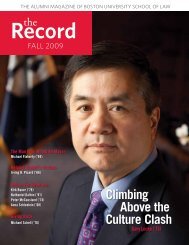the nature of representation: the cherokee right ... - Boston University
the nature of representation: the cherokee right ... - Boston University
the nature of representation: the cherokee right ... - Boston University
Create successful ePaper yourself
Turn your PDF publications into a flip-book with our unique Google optimized e-Paper software.
2005] THE NATURE OF REPRESENTATION 151<br />
prior Indian treaties. Joseph Singer explains, “The plenary power doctrine <strong>of</strong> Lone<br />
Wolf v. Hitchcock is <strong>of</strong>ten invoked to defend <strong>the</strong> proposition that <strong>the</strong> United States<br />
has absolute power over Indian nations.” 299<br />
In writing about <strong>the</strong> trust doctrine,<br />
Mary Christina Wood tried to separate <strong>the</strong> trust doctrine from plenary power<br />
because “<strong>the</strong> ‘plenary power’ doctrine . . . affords Congress almost unfettered<br />
latitudeindealingwithtribes....” 300<br />
In United States v. Lara, <strong>the</strong> Supreme<br />
Court wrote, “<strong>the</strong> Constitution grants Congress broad general powers to legislate<br />
in respect to Indian tribes, powers that we have consistently described as ‘plenary<br />
and exclusive.’” 301 Writing about a distinct dispute, Singer notes that <strong>the</strong><br />
abrogation <strong>of</strong> a treaty “by <strong>the</strong> unilateral act <strong>of</strong> <strong>the</strong> Congress is <strong>of</strong> no consequence—<br />
it is an irrelevant, but mildly interesting fact.” 302 The delegate <strong>right</strong> could simply<br />
be done away with by a Congress that chooses to ignore <strong>the</strong> New Echota Treaty<br />
obligation, as is true <strong>of</strong> almost every <strong>right</strong> held by Indian tribes. 303<br />
Yet, if <strong>the</strong> Cherokees do not push for <strong>the</strong>ir <strong>right</strong> to a Congressional delegate,<br />
<strong>the</strong>y, through <strong>the</strong>ir own inaction, will have already lost <strong>the</strong> most important <strong>right</strong> <strong>of</strong><br />
<strong>the</strong> removal treaty. On <strong>the</strong> o<strong>the</strong>r hand, for <strong>the</strong> Cherokees, who “under any<br />
circumstances, have no weapon to use but argument,” 304 <strong>the</strong> push for a Cherokee<br />
delegate would be a powerful way to call attention to removal. Fur<strong>the</strong>rmore, this<br />
would point out <strong>the</strong> possibility that <strong>the</strong> U.S. still could honor, ei<strong>the</strong>r specifically<br />
or through substitute means, an important treaty <strong>right</strong>. Although <strong>the</strong> push for <strong>the</strong><br />
specific <strong>right</strong> may fail, it would highlight <strong>the</strong> needs <strong>of</strong> <strong>the</strong> Cherokee Nation and <strong>the</strong><br />
ways in which Americans continue to benefit from Cherokee removal.<br />
Article 7 <strong>of</strong> <strong>the</strong> Treaty <strong>of</strong> New Echota is a reminder that <strong>the</strong> U.S. would be<br />
indebted to <strong>the</strong> Cherokees and under a moral obligation to <strong>the</strong>m if a delegate<br />
uniquely representing <strong>the</strong> Cherokee Nation were not allowed. 305 The Cherokees<br />
299<br />
Joseph William Singer, Legal Theory: Sovereignty and Property, 86NW. U.L.<br />
REV. 1, 14 (1991) (citation omitted).<br />
300<br />
Mary Christina Wood, Protecting <strong>the</strong> Attributes <strong>of</strong> Native Sovereignty: A New<br />
Trust Paradigm For Federal Actions Affecting Tribal Lands and Resources, 1995<br />
UTAH L. REV. 109, 112 (1995).<br />
301<br />
541 U.S. 193, 200 (2004).<br />
302<br />
Singer, supra note 299, at 26 (observing as well that <strong>the</strong>re is a single exception,<br />
that equivalent value must be given for land taken by Congress).<br />
303<br />
Asnotedin<strong>the</strong>super-vote section, supra Section IV.C., <strong>the</strong> Cherokee delegate<br />
<strong>right</strong> also might be brought down by a court challenge, regardless <strong>of</strong> <strong>the</strong> desires <strong>of</strong><br />
Congress. Deloria and Wilkins explain, “[t]he bottom line for American Indians is that<br />
ultimately <strong>the</strong> federal courts determine <strong>the</strong> federal relationship with Indians.” VINE<br />
DELORIA,JR.&DAVID E. WILKINS,TRIBES,TREATIES, AND CONSTITUTIONAL TRIBULATIONS 57<br />
(1999).<br />
304<br />
Memorial from <strong>the</strong> Cherokee Delegation headed by John Ross to <strong>the</strong> U.S. Senate<br />
and House <strong>of</strong> Representatives (Jun. 21, 1836), in 1THE PAPERS OF CHIEF JOHN ROSS,<br />
supra note 14, at 455.<br />
305<br />
In 1839, John Ross tellingly wrote, “[t]he injuries and losses sustained by <strong>the</strong><br />
Nation from <strong>the</strong> whites in violation <strong>of</strong> treaty stipulations, holds a strong claim on <strong>the</strong><br />
justice <strong>of</strong> <strong>the</strong> people and Govt. <strong>of</strong> <strong>the</strong> U. States which it is to be hoped will in <strong>the</strong> end be









